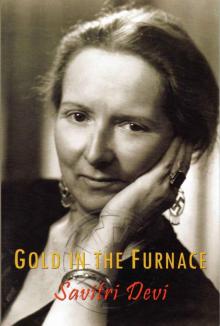Gold in the Furnace


Author: Savitri Devi
Category: Other2
Published: 2013
Series:
View: 503
Read OnlineGold in the Furnace is an ardent National Socialist’s vivid and moving account of life in occupied Germany in the aftermath of World War II, based on extensive travels and interviews conducted in 1948 and 1949.Savitri Devi is scathing in her description of Allied brutality and hypocrisy: millions of German civilians died in Allied firebombing; millions more perished after the war, driven from their homes by Russians, Czechs, and Poles; more than a million prisoners of war perished from planned starvation or outright murder in Allied concentration camps; untold thousands more disappeared into slave labor camps from the Congo to Siberia.Savitri Devi describes in vivid detail how individual National Socialists were subjected to “de-Nazification” by Germany’s democratic “liberators”: murder, torture, starvation, show-trials, imprisonment, and execution for the higher echelons; petty indignities and recantations extorted under the threat of imprisonment, hunger, and the denial of livelihood for ordinary party members. She also chronicles the systematic plunder of Germany by the Allies: the clear-cutting of ancient forests, the dismantling of factories, the theft of natural resources.In spite of the disaster, Savitri Devi did not view it as the end of National Socialism, but as a purification—a trial by fire separating the base metal from the gold—a prelude to a new beginning. Thus Savitri also devotes chapters to presenting the basic philosophy and the constructive political program of National Socialism.Gold in the Furnace is a valuable historical document: of the National Socialists who never lost faith, despite suffering, persecution and martyrdom—of the ordinary Germans who revered Hitler even after the war—of the widespread rumors of Hitler’s survival—of the hopes of imminent National Socialist revival, perhaps in the aftermath of a Third World War—of the expectations of Soviet victory in such a war—and of the philosophy, experiences, and unique personality of a remarkable woman.
 The Enchantress
The Enchantress Masked SheWolf
Masked SheWolf An Okinawan Affair
An Okinawan Affair Bad Girl: Les Pétales
Bad Girl: Les Pétales When She Was Good
When She Was Good Darklight 7: Darkfall
Darklight 7: Darkfall Liveforever
Liveforever Guarding Kinsley: Brotherhood Protectors World (Texas Guardians Book 3)
Guarding Kinsley: Brotherhood Protectors World (Texas Guardians Book 3)